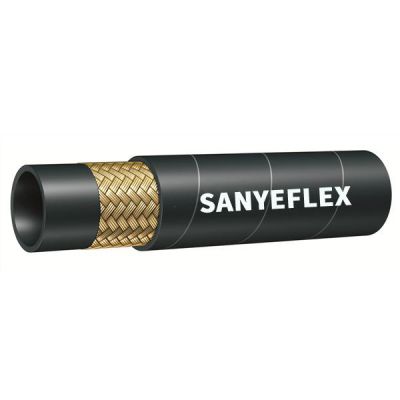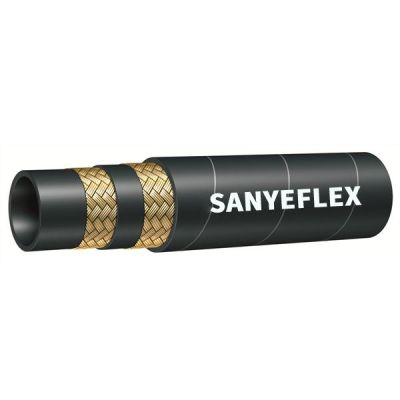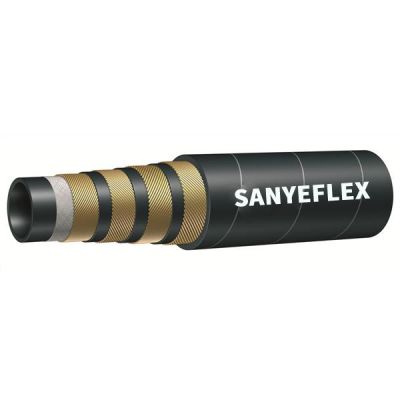Jan. 16, 2025
Textile braided hoses are essential in many industries, providing flexibility and durability for fluid transfer applications. Despite their robust construction, these hoses can still fail under certain conditions. Understanding the reasons behind their failure can help in preventing such issues and ensuring the longevity of the hoses. This article explores the common causes of textile braided hose failures and offers insights into how to mitigate these risks.
One of the primary reasons textile braided hoses fail is due to abrasion and physical damage. The braided textile layer, while durable, can wear down over time when exposed to rough surfaces or constant friction.
External Abrasion: Hoses that are dragged across abrasive surfaces or subjected to repeated contact with sharp objects will experience wear and tear. This abrasion weakens the hose material, eventually leading to leaks or bursts.
Impact Damage: Physical impacts from heavy objects or machinery can crush or puncture the hose, compromising its structural integrity. Regular inspections and protective measures can help reduce the risk of such damage.
Chemical exposure is another significant cause of textile braided hose failure. The hose materials can degrade when exposed to certain chemicals, especially if they are not designed to handle those specific substances.
Incompatible Fluids: Using hoses with fluids they are not rated for can lead to chemical reactions that weaken the hose material. Ensuring that the hose material is compatible with the conveyed fluids is crucial in preventing chemical degradation.
Chemical Permeation: Some chemicals can permeate through the hose material over time, causing internal damage that may not be immediately visible. Regular checks and proper hose selection can mitigate this risk.
Extreme temperatures can adversely affect the performance and lifespan of textile braided hoses. Both high and low temperatures can cause the hose materials to deteriorate.
High Temperatures: Excessive heat can cause the hose material to become brittle and crack. This is particularly problematic in applications involving hot fluids or environments with high ambient temperatures.
Low Temperatures: Cold temperatures can make the hose material stiff and prone to cracking or bursting under pressure. Using hoses designed for specific temperature ranges can help prevent failures related to thermal extremes.
Improper installation and usage practices can lead to premature hose failure. Ensuring that hoses are installed correctly and used within their specified parameters is essential for their longevity.
Incorrect Bending Radius: Bending hoses beyond their recommended radius can cause kinks and internal damage, leading to leaks and failures. Following manufacturer guidelines for bending radius is critical.
Excessive Pressure: Operating hoses beyond their rated pressure capacity can cause them to burst. It’s important to ensure that the operating pressure does not exceed the hose’s specified limits.
Neglecting regular maintenance is a common cause of hose failure. Routine inspections and maintenance can identify potential issues before they lead to significant problems.
Insufficient Inspections: Failing to conduct regular inspections can result in unnoticed wear and damage, leading to unexpected hose failures. Scheduled inspections can help catch issues early.
Delayed Replacements: Using hoses beyond their recommended service life increases the risk of failure. Replacing hoses according to manufacturer recommendations can prevent failures due to material fatigue.
Textile braided hoses can fail due to abrasion, chemical degradation, temperature extremes, improper installation, and lack of maintenance. Understanding these causes and taking proactive measures can significantly extend the lifespan of these hoses. Regular inspections, proper hose selection, and adherence to usage guidelines are key to preventing hose failures. For more detailed advice on preventing hose failures or to find the right hoses for your application, please contact us. As a trusted supplier, we are dedicated to providing high-quality hose solutions tailored to your needs.
Our Customer
Tel.: +86 400 0318 111
Email: admin@sanyeflex.com
Add.: #218 Zhongke Street, High-tech Zone, Hengshui City, Hebei Province, China


